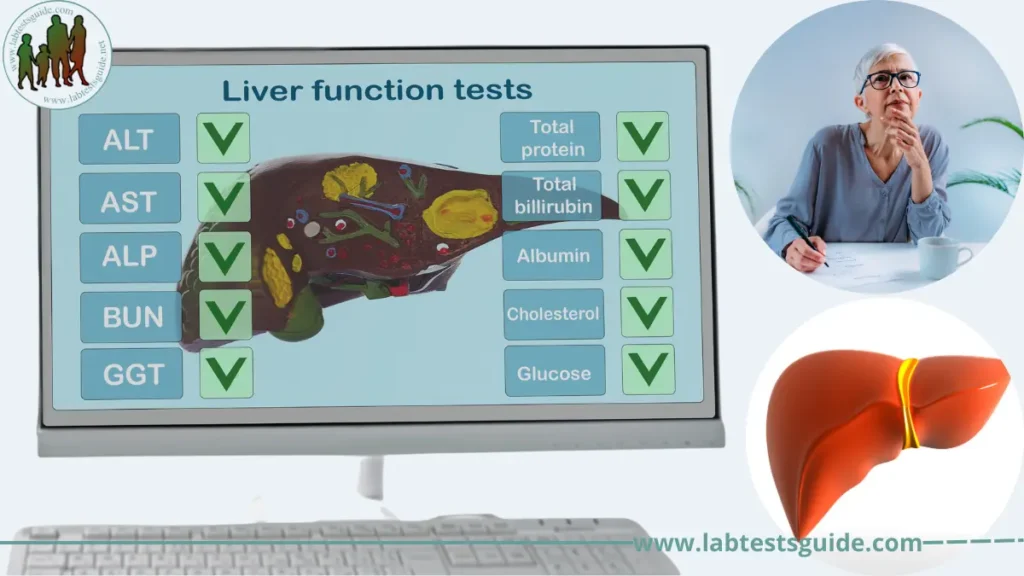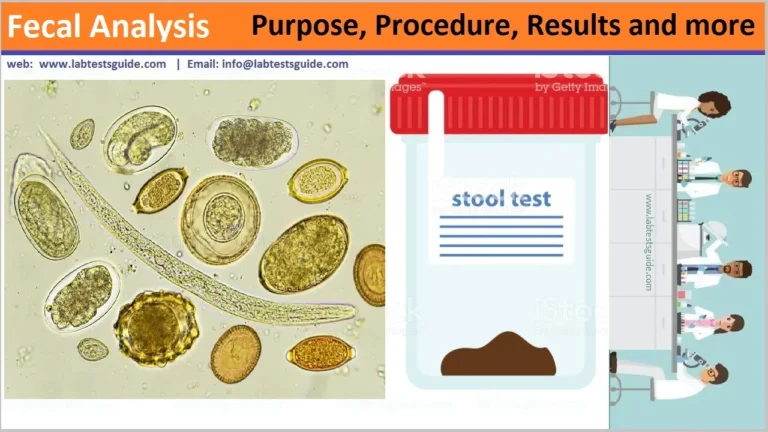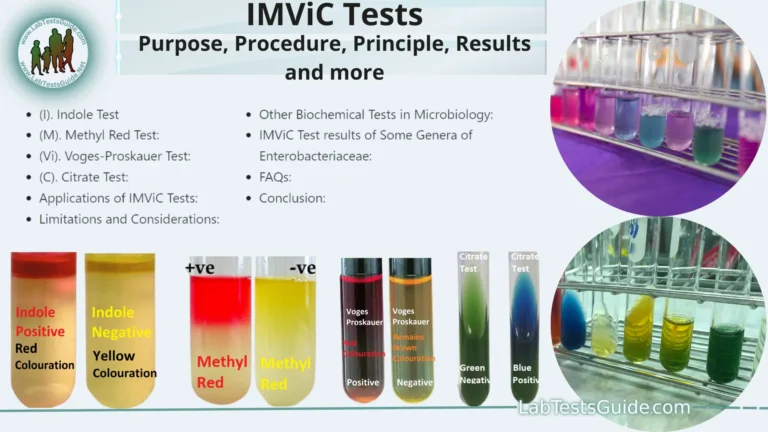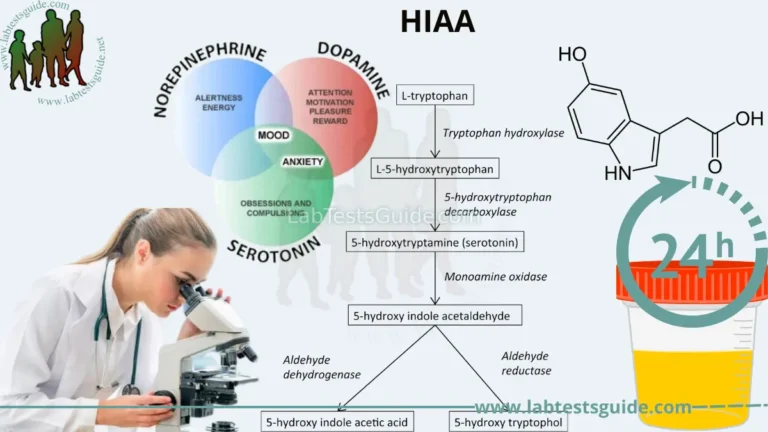Liver Function Tests (LFT’s) are a group of blood tests that provide information about the function and health of the liver. These tests are commonly performed to assess liver function, diagnose liver diseases, monitor treatment effectiveness, and evaluate overall liver health.
| Also Known as | Hepatic Function Tests (HFTs), Liver Panel, Liver Enzyme Tests, Liver Blood Tests, Liver Chemistry Panel, Liver Function Panel, Liver Profile, Liver Tests, Liver Panel of Blood Tests, Hepatobiliary Tests |
| Test Preparations | No special preparation required |
| Test Components | Total Bilirubin, Conjugated Bilirumin, Unconjugated Bilirubin, ALT (SGPT), AST (SGOT), Alkaline Phasphatase, Total Protein (TP), Albumin, Globuline, A/G Ratio, Gamma GT (GGT) |
| Specimen | 2 mL (1.5 mL min.) serum from 1 SST. Ship refrigerated or frozen. |
| Stability Room | 2 Hours |
| Stability Refrigerated | 24 Hours |
| Stability Frozen | 1 Week |

Definition of Liver Function Tests (LFTs):
Liver Function Tests (LFTs) refer to a group of blood tests that are conducted to assess the function and health of the liver. These tests measure various substances and enzymes in the blood that are produced by or related to the liver. LFTs help healthcare providers evaluate how well the liver is functioning, detect liver diseases or conditions, monitor the progression of liver diseases, and assess the impact of medications or treatments on liver health.
Importance of LFTs in assessing liver health:
Here is a list highlighting the importance of Liver Function Tests (LFTs) in assessing liver health:
- Early Detection of Liver Diseases: LFTs play a crucial role in the early detection of liver diseases. Abnormal LFT results can indicate liver dysfunction or damage, allowing healthcare providers to identify and intervene in liver diseases at an earlier stage.
- Monitoring Liver Function: LFTs are valuable for monitoring the ongoing function of the liver in individuals with known liver diseases. Regular LFTs help healthcare providers track changes in liver enzymes and other markers, assess disease progression, and evaluate the effectiveness of treatments.
- Assessing Liver Damage and Inflammation: Elevated levels of liver enzymes, such as ALT and AST, in LFTs can indicate liver cell damage or inflammation. These markers help healthcare providers evaluate the severity and extent of liver injury and guide further investigations or interventions.
- Differentiating Liver Diseases: LFTs assist in distinguishing between different types of liver diseases. Patterns of abnormalities in liver enzymes and other markers can provide clues about the underlying cause, such as viral hepatitis, alcoholic liver disease, non-alcoholic fatty liver disease (NAFLD), autoimmune hepatitis, or drug-induced liver injury.
- Monitoring Medication Effects: Some medications can impact liver function or cause liver toxicity. LFTs help monitor the effects of medications on the liver, allowing healthcare providers to adjust dosages, switch medications, or intervene if adverse liver reactions occur.
- Evaluation of Overall Liver Health: LFTs provide an overall assessment of liver health and function. Parameters such as albumin, bilirubin, and PT/INR reflect the liver’s synthetic capacity, metabolism of bilirubin, and production of clotting factors, respectively. Deviations from normal ranges in these markers can indicate liver dysfunction or impaired liver performance.
- Surgical Risk Assessment: LFTs are often performed before surgeries to evaluate liver function and assess the risk of surgical complications related to anesthesia and postoperative liver function.
- Screening Tool: LFTs can serve as a screening tool for individuals with risk factors for liver diseases, such as chronic alcohol consumption, viral hepatitis infection, obesity, or diabetes. Regular LFTs help identify liver abnormalities early and prompt further evaluation or interventions.
It’s important to note that LFTs provide valuable insights into liver health, but they are not diagnostic on their own. Further testing and medical evaluation are typically required to determine the underlying cause of abnormal results and develop an appropriate management plan.
Why Get Tested:
- Liver Disease Diagnosis: LFTs help evaluate liver health and detect liver diseases such as hepatitis, cirrhosis, fatty liver disease, or liver cancer.
- Monitoring Liver Function: Regular LFTs are used to monitor the progression of liver diseases, assess treatment effectiveness, and evaluate overall liver function.
- Medication Evaluation: LFTs assess the liver’s ability to process medications and monitor potential adverse effects on liver function.
- Alcohol Consumption Assessment: LFTs evaluate the impact of alcohol on liver function and determine the extent of liver damage.
- Suspected Liver Injury: LFTs may be ordered when there is concern about liver injury due to exposure to toxins, jaundice, abdominal pain, or symptoms of liver dysfunction.
- Routine Health Check-up: LFTs are included in routine health screenings to assess liver function and detect early signs of liver abnormalities or diseases.
Please note that this is not an exhaustive list, and specific reasons for testing may vary based on individual circumstances and healthcare provider recommendations.
When to get Tested:
- Symptoms of Liver Disease: If you are experiencing symptoms such as jaundice (yellowing of the skin and eyes), abdominal pain, unexplained fatigue, loss of appetite, nausea, vomiting, or dark urine, it may be necessary to undergo LFTs to assess liver function and investigate potential liver diseases.
- Abnormal Liver Enzymes: If routine blood tests or previous LFTs have shown elevated liver enzyme levels, it may be necessary to repeat the tests to monitor liver function and identify the underlying cause of the abnormalities.
- Risk Factors for Liver Disease: If you have risk factors for liver disease, such as a history of heavy alcohol consumption, exposure to hepatotoxic substances (chemicals, drugs, toxins), viral hepatitis infection, obesity, diabetes, or a family history of liver disease, your healthcare provider may recommend regular LFTs to monitor liver health.
- Medication or Treatment Monitoring: If you are taking medications that can potentially affect liver function or undergoing treatments known to impact the liver, such as chemotherapy or long-term use of certain medications, LFTs may be ordered to monitor liver function and ensure the safety and effectiveness of the treatment.
- Preoperative Assessment: Before certain surgeries or medical procedures, LFTs may be performed to evaluate liver function and assess the risk of complications related to anesthesia or surgery.
- Routine Health Check-up: LFTs may be included as part of routine health screenings or annual check-ups to assess overall liver function and detect any early signs of liver abnormalities or diseases.
It’s important to consult with your healthcare provider for personalized advice on when to get tested with LFTs, as recommendations may vary based on individual risk factors, medical history, and clinical judgment.
Pre Test Preparation:
Here is a short list of pre-test preparations for liver function tests (LFTs):
- Fasting: Follow the fasting instructions provided, typically 8 to 12 hours before the test.
- Medication Review: Inform your healthcare provider about all medications you are taking and follow their guidance regarding medication use before the test.
- Alcohol and Caffeine: Avoid consuming alcohol for at least 24 hours before the test and limit or avoid caffeine-containing beverages.
- Water Intake: Generally, drinking water before the test is acceptable and can help with blood draw.
- Follow Instructions: Adhere to any specific instructions provided by your healthcare provider regarding pre-test preparations.
Remember, these are general guidelines, and it’s essential to consult with your healthcare provider for any specific instructions or modifications based on your individual circumstances.
Required sample:
- It is done on the serum of the patient.
- Heparinized plasma can be used.
- A random sample can be taken.
- The serum is stable for 3 days at 1 to 6 °C.
Common Test in LFTs Panel:
Theses tests are tested in Liver Function Tests (LFT’s) :
- Total Bilirubin
- Conjugated Bilirumin
- Unconjugated Bilirubin
- ALT (SGPT)
- AST (SGOT)
- Alkaline Phasphatase
- Total Protein (TP)
- Albumin
- Globuline
- A/G Ratio
- Gamma GT (GGT)
When LFTs Orderd :
A liver panel, or one or more of its components, may be ordered when someone is at risk for liver dysfunction. Some examples include:
- People who take medications that may potentially damage the liver
- Those who are alcoholics or heavy drinkers
- Those who have a history of known or possible exposure to hepatitis viruses
- Individuals whose families have a history of liver disease
- People who are overweight, especially if they have diabetes and/or high blood pressure
A liver panel may be ordered when a person has signs and symptoms of liver disease; however, most people who have liver disease do not have any of these symptoms until the disease has been present for many years or is very severe. Some of these include:
- Weakness, fatigue
- Loss of appetite
- Nausea, vomiting
- Abdominal swelling and/or pain
- Jaundice (yellowing of eyes or skin)
- Dark urine, light-colored stool
- Itching (pruritus)
- Diarrhea
Usually no one single set of liver tests is used to make a diagnosis. Often, several liver panels will be ordered over a few days or weeks to help determine the cause of the liver disorder and evaluate its severity
Normal Values
| Test | Normal value |
| Total bilirubin | o.3 to 1.0 mg/dL Newborn : 1.0 to 12.0 mg/dL. |
| Conjugated bilirubin | 0.1 to 0.3 mg/dL |
| Unconjugated bilirubin | 0.1 to 0.8 mg/dL |
| Alkaline phosphatase | Adult = 30 to 120 units/L Child <2 years = 85 to 235 units/L 2 to 8 years = 65 to 210 units/L 9 to 15 years = 60 to 300 units/L 16 to 21 years = 30 to 200 units/L |
| SGOT (AST) | Adult = 0 to 35 units Elderly = values slightly higher than adult Newborn and infants = 15 to 60 units/L |
| SGPT (ALT) | Adult and child = 4 to 40 units/L Infants may be twice high as the adult value |
| Albumin | Adult = 3.5 to 5 g/dL Premature infants = 3 to 4.2 g/dL Newborn = 3.5 to 5.5 g/dL Infant = 4.4 to 5.4 g/dLChild = 4 to 5.9 g/dL |
| Total protein | 6.4 to 8.3 g/dL |
| A/G ratio | 0.8 to 2.0 |
| Gamma-glutamyl transferase (γ-GT). | Adult >45 years = 8 to 38 units/L Female <45 years = 5 to 27 units/L Child like adult level Newborn = 5 times higher than adult level |
What does the test result mean?
| Type of liver condition or disease | Bilirubin | ALT and AST | ALP | Albumin | PT |
| Acute liver damage (due, for example, to infection, toxins or drugs, etc.) | Normal or increased usually after ALT and AST are already increased | Usually greatly increased (> 10 times); ALT is usually higher than AST | Normal or only moderately increased | Normal | Usually normal |
| Chronic forms of various liver disorders | Normal or increased | Mildly or moderately increased; ALT is persistently increased | Normal to slightly increased | Normal | Normal |
| Alcoholic Hepatitis | Normal or increased | AST is moderately increased, usually at least twice the level of ALT | Normal or moderately increased | Normal | Normal |
| Cirrhosis | May be increased but this usually occurs later in the disease | AST is usually higher than ALT but levels are usually lower than in alcoholic disease | Normal or increased | Normal or decreased | Usually prolonged |
| Bile duct obstruction, cholestasis | Normal or increased; increased in complete obstruction | Normal to moderately increased | Increased; often greater than 4 times what is normal | Usually normal but if the disease is chronic, levels may decrease | Usually normal |
| Cancer that has spread to the liver (metastasized) | Usually normal | Normal or slightly increased | Usually greatly increased | Normal | Normal |
| Cancer originating in the liver (hepatocellular carcinoma, HCC) | May be increased, especially if the disease has progressed | AST higher than ALT but levels lower than that seen in alcoholic disease | Normal or increased | Normal or decreased | Usually prolonged |
| Autoimmune | Normal or increased | Moderately increased; ALT usually higher than AST | Normal or slightly increased | Usually decreased | Normal |
Factors Affecting LFT Results:
Here is a short list of factors that can affect Liver Function Test (LFT) results:
- Medications: Certain medications can impact liver enzyme levels and other LFT parameters.
- Alcohol Consumption: Excessive or chronic alcohol consumption can influence LFT results.
- Fasting: Fasting requirements for some LFTs may affect test results.
- Obesity: Obesity can affect LFT parameters, such as liver enzyme levels.
- Pregnancy: Pregnancy can cause changes in LFT results, particularly in certain parameters like alkaline phosphatase (ALP).
It’s important to discuss these factors with your healthcare provider and follow any specific instructions provided to ensure accurate and reliable LFT results.
FAQs:
What are Liver Function Tests (LFTs)?
Liver Function Tests (LFTs) are a group of blood tests that assess the function and health of the liver. These tests measure various substances and enzymes in the blood that are produced by or related to the liver.
How are LFTs performed?
LFTs are typically performed by drawing a blood sample from a vein in your arm. The blood sample is then sent to a laboratory for analysis.
What do LFTs measure?
LFTs measure various parameters, including liver enzymes (such as ALT, AST, ALP, and GGT), bilirubin levels, albumin levels, and clotting factors (such as PT/INR). These measurements provide insights into liver function, liver damage, and overall liver health.
What do abnormal LFT results mean?
Abnormal LFT results can indicate liver dysfunction, liver damage, or liver diseases. However, abnormal results do not provide a specific diagnosis. Further evaluation and additional tests may be necessary to determine the underlying cause of the abnormalities.
Do I need to fast before getting LFTs?
Some LFTs may require fasting before the blood draw. You should follow any fasting instructions provided by your healthcare provider, which usually involve avoiding food and drink (except water) for a specific period, typically 8 to 12 hours, before the test.
How long does it take to get LFT results?
The turnaround time for LFT results can vary depending on the laboratory and the specific tests performed. In many cases, results are available within a few days.
. Can medications or alcohol affect LFT results?
Yes, certain medications and excessive alcohol consumption can influence LFT results. It is important to inform your healthcare provider about all medications you are taking and to abstain from alcohol as recommended before undergoing LFTs.
Are LFTs painful?
The blood draw for LFTs involves a needle prick, which may cause some discomfort, but it is generally well-tolerated. If you have concerns about the procedure, you can discuss them with the healthcare professional performing the test.
Conclusion:
In conclusion, Liver Function Tests (LFTs) are valuable diagnostic tools used to assess liver function and detect liver diseases. They provide insights into liver health, liver enzyme levels, bilirubin levels, albumin levels, and clotting factors. LFTs help healthcare providers diagnose liver conditions, monitor disease progression, evaluate the effects of medications or treatments on the liver, and assess overall liver function. It’s important to follow any specific instructions provided by your healthcare provider before undergoing LFTs, such as fasting requirements or medication adjustments. While abnormal LFT results can indicate liver dysfunction or damage, further evaluation and additional tests are typically needed to establish a specific diagnosis. If you have concerns about your liver health or need to undergo LFTs, it’s essential to consult with your healthcare provider for accurate interpretation and appropriate management.
Home | Blog | About Us | Contact Us | Disclaimer







Thanks